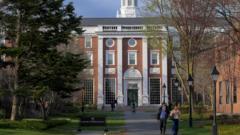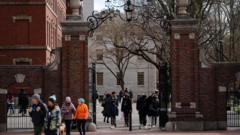The Trump administration has threatened to ban Harvard University from enrolling foreign students and freeze its federal funding over accusations of inadequate measures against antisemitism. Harvard's President, Alan Garber, has asserted the university's commitment to autonomy and constitutional rights, challenging the legitimacy of the White House's demands.
Harvard University Resists White House Pressure Amid Threats of Funding Cuts

Harvard University Resists White House Pressure Amid Threats of Funding Cuts
Harvard stands firm against the Trump administration's demands to alter its policies, facing potential bans on foreign students and financial repercussions.
The Trump administration has escalated its conflict with Harvard University, posing a significant threat to the institution's ability to enroll foreign students amid a backdrop of funding freezes and demands to alter its practices concerning antisemitism. Harvard has firmly rejected a sweeping list of requirements set forth by the White House, asserting its independence and commitment to constitutional rights.
Homeland Security Secretary Kristi Noem's latest correspondence demands records related to what she describes as "illegal and violent" actions by foreign students at Harvard. Should the university fail to comply, it risks losing the "privilege of enrolling foreign students," an alarming prospect considering that international students represent over 27% of the school's current enrollment.
In addition to the potential implications on its student body, Harvard faces a freeze on approximately $2.2 billion in federal funding, which has become increasingly precarious under the Trump administration. The president has also hinted at the possibility of revoking Harvard's tax-exempt status, a move that could greatly impact the university's financial stability. Harvard officials maintain that there is no legal basis for such an action, cautioning that it could jeopardize their educational mission.
This conflict reflects a broader trend where the Trump administration has escalated its scrutiny of higher education institutions perceived as antagonistic to conservative values. Recent polling indicates a declining trust in higher education among Americans, particularly among Republican constituencies, who argue that universities propagate specific political agendas. The administration's targeted review of at least 60 universities, particularly those experiencing pro-Palestinian protests, highlights a growing contentiousness, as some Jewish students have reported feeling unsafe on campus.
While some institutions, like Columbia University, have capitulated to presidential presses, Harvard appears to stand resolute, having made certain concessions but firmly rejecting the detailed list of demands from the White House.
As the situation develops, the future of Harvard's independence, its foreign student population, and significant federal funding hangs in a challenging balance, characterized by a contentious climate between higher education and the current administration.





















